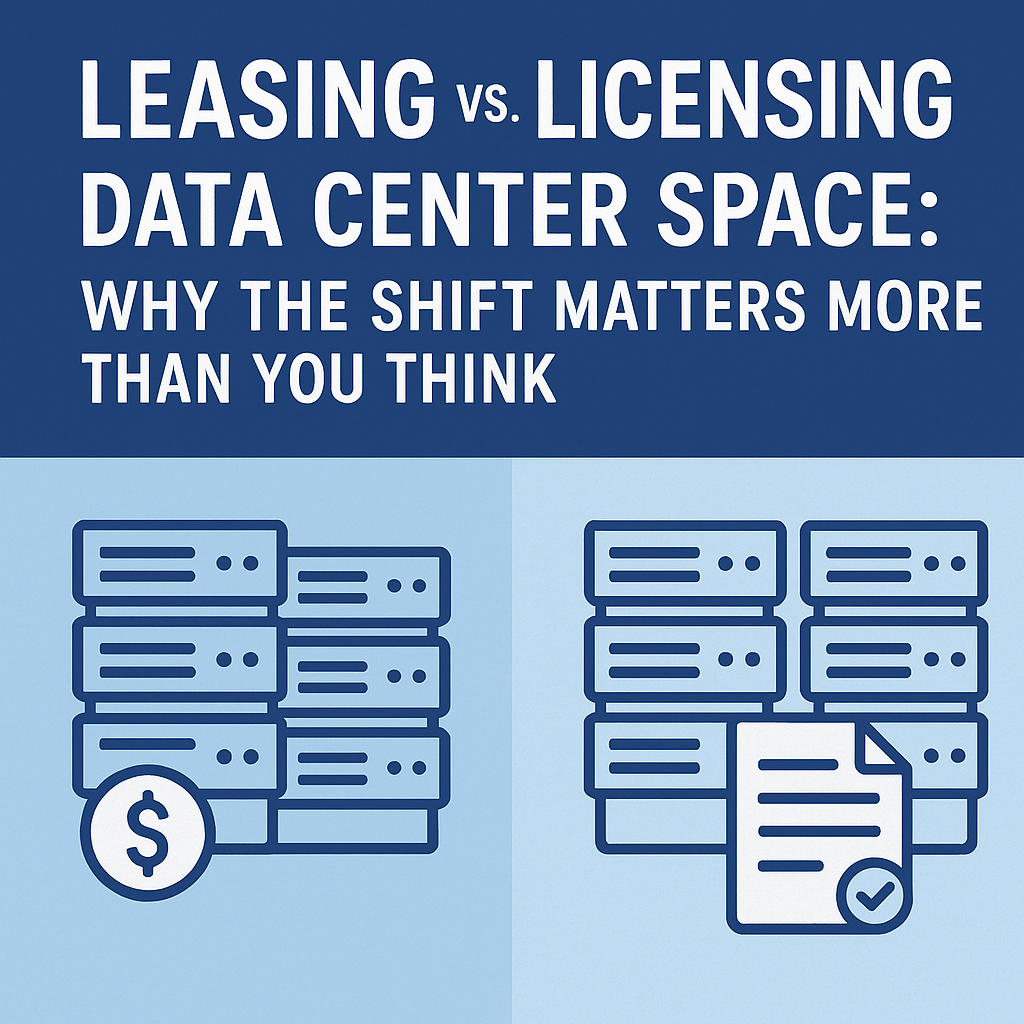Introduction: A Tale of Two Data Center Customers
Imagine two companies, both in the middle of expanding their digital footprint.
- Company A moves into a colocation facility under a lease agreement. They know exactly how much space they control. Their IT team installs racks, wires servers, and locks up. The space is theirs — legally, physically, and practically. If the data center operator wants them out, the operator must follow landlord-tenant law. Company A sleeps at night knowing their critical workloads won’t suddenly lose a home.
- Company B signs up under a license. They too set up racks, plug in servers, and get to work. But unlike Company A, they don’t actually “own” the right to that space. They’re more like guests with permission to use it. If the operator wants to change terms, adjust fees, or even reclaim the space, Company B has far less legal recourse. Their rights depend entirely on what’s written in the contract, and most contracts are tilted toward the provider.
This isn’t just a legal technicality — it’s a fundamental shift in how businesses interact with data centers. And it’s happening quietly across the industry.
In data center leasing, landlords and tenants often negotiate strict rules about access, security, maintenance, utility continuity, and environmental controls. Because the stakes are high (infrastructure, uptime, compliance), these lease agreements tend to be dense with technical and legal detail. (See “Key Tenant Issues in Data Center Leasing Agreements” for a deeper dive into negotiating access, maintenance, and response regimes)
Leasing: The Old Way That Felt Familiar
For decades, companies treated data center arrangements much like commercial real estate. Leasing made intuitive sense:
- Exclusive Possession: Just as you’d lease an office floor, you’d lease a cage or suite inside a data center. The space was yours to occupy, secured under property law.
- Stability: Leases typically spanned years, often five, ten, or even more. This gave IT leaders confidence to make long-term infrastructure investments.
- Legal Protections: Tenants enjoyed statutory rights under landlord-tenant law. Eviction required process, not whim.
- Flexibility: Many leases allowed subleasing or transfer, giving customers room to adapt if their needs changed.
In practice, leasing felt like a firm handshake deal — predictable, grounded, and enforceable. Customers weren’t just service users; they were tenants with real rights.
Licensing: The New Paradigm
In many modern data center agreements, providers explicitly describe the arrangement as a “license” to avoid letting the arrangement be characterized as a lease under legal doctrine. But just calling it a license is not enough: courts will look at substance over label, particularly whether exclusive possession is granted. In the UK context, legal experts observe that even if an agreement labels itself a license, if it grants exclusive occupation in practice, a court might treat it as a lease (or “legal estate”) anyway (Colocation – lease or licence? – Bird & Bird.)
Fast forward to today. Walk into most modern colocation contracts and you won’t find the word “lease.” Instead, you’ll find “license.”
A license sounds harmless enough. After all, we license software, apps, even music. But in the data center world, licensing carries heavy implications:
- No Property Interest: Customers don’t gain a legal foothold in the space. They’re more like temporary users than tenants.
- Easy Termination: Providers reserve the right to revoke or change the license far more easily than terminating a lease.
- Absolute Provider Control: Want to sublease space to a partner? Not under a license. Want assurance your cage won’t be moved or modified? That depends entirely on contract wording.
- Reduced Stability: Licenses are often shorter-term and more easily renegotiated, creating budgeting uncertainty.
In other words, licensing reframes the relationship from “tenant and landlord” to “customer and service provider.”
Why Providers Prefer Licensing
The shift didn’t happen by accident. Licensing offers enormous advantages to data center operators:
- Flexibility to Reallocate Space
Leasing ties up real estate. A provider that commits a cage to one tenant for 10 years can’t easily shuffle capacity. Licensing, by contrast, lets them reassign space, restructure layouts, and optimize utilization without legal friction. - Avoiding Landlord-Tenant Law
Landlord-tenant law is designed to protect occupants, not landlords. By steering clear of lease structures, providers avoid legal obligations like eviction processes, rent control statutes, or statutory repair duties. - Revenue Agility
Licensing gives providers the freedom to adjust pricing models, layer on fees, or upsell additional services. Customers can’t easily push back using lease-based protections. - Operational Control
Providers argue they need strong authority to enforce rules around security, compliance, and safety. A license gives them that authority.
From a provider’s point of view, licensing makes business more nimble, profitable, and controllable.
In recent publications on structuring data center contracts, legal analysts note that while leases and service agreements often look similar in practice, the choice between them matters fundamentally in how much legal protection the customer actually receives. Factors To Consider When Structuring Data Center Contracts – Mayer Brown Another treatise on data center legal structure warns that when a contract is labeled as a service contract rather than a lease, the customer often loses the optional protections of property law; the legally controlling classification may differ based on fact, despite the label. Legal Considerations for Data Center Development and Operation Project – No and T
How Customers Lose Out
The flip side, of course, is what customers lose in the process. Let’s break it down:
Loss of Legal Rights
Under a lease, a customer can argue wrongful eviction if the provider tries to terminate unfairly. Under a license, most of those arguments vanish. Customers have only contractual remedies, which are often written to favor the provider.
Reduced Stability
Imagine building your IT roadmap around a five-year data center footprint — then being told your license can be terminated with 90 days’ notice. That kind of instability can derail budgets, compliance certifications, and disaster recovery planning.
No Subleasing or Assignment
In a lease, you might sublease unused racks to a partner or assign your lease during an acquisition. In a license, those options rarely exist. If your needs shrink, you’re stuck paying for space you can’t use.
Pricing Risk
Licenses often allow providers to adjust service fees more freely. This can lead to creeping costs, unpredictable renewals, and budget overruns.
Business Continuity Risk
Perhaps the most serious: if your license is terminated or restricted, you could lose access to your physical infrastructure. For mission-critical operations, that’s not just inconvenient — it’s potentially catastrophic.
Why Companies Accept Licensing Anyway
Given these downsides, you might wonder: why do so many businesses sign licenses at all? A few reasons:
- Market Reality: Many providers simply don’t offer leases anymore. If you want space in a major colocation hub, you’ll likely be presented with a license, take it or leave it.
- Convenience: Licenses often come with bundled services, quicker onboarding, and more flexible short-term commitments. Startups and fast-scaling businesses sometimes prefer this.
- Misunderstanding: Many IT buyers assume “license” and “lease” are interchangeable terms and don’t fully grasp the legal distinctions until it’s too late.
- Negotiation Leverage: Large enterprises sometimes negotiate stronger license terms, softening the impact. Smaller businesses rarely have that luxury.
The Licensor’s Advantages, Spelled Out
For providers, the move toward licensing is a clear win:
- Control: They retain maximum control over their space and operations.
- Agility: They can respond quickly to demand shifts and reallocate resources.
- Revenue Optimization: They can increase profitability through dynamic pricing and service add-ons.
- Reduced Legal Exposure: They avoid the headaches of landlord-tenant disputes.
It’s a textbook case of shifting risk from the provider to the customer.
The Hidden Costs for Customers
The problem isn’t just theoretical. Companies under license agreements often face real-world challenges:
- Unexpected Relocations: A provider might reserve the right to move your cage within the facility. For highly sensitive operations, this can be a nightmare.
- Termination Risks During M&A: If your company is acquired, the provider may block assignment of the license, complicating the deal.
- Compliance Headaches: Uncertainty around space and access can undermine certifications like SOC 2, HIPAA, or PCI DSS.
- Negotiation Fatigue: Renewals become a repeated negotiation rather than a predictable renewal process.
Humanizing the Impact: What It Means for CIOs and IT Teams
Picture being a CIO whose company just signed a licensing agreement. The board assumes the data center footprint is secure. But one clause in the contract allows the provider to terminate “at will” with 120 days’ notice.
That risk doesn’t show up on a balance sheet. But it sits in the back of your mind every time you approve a new system deployment, every time your compliance officer asks for assurance, every time your CEO asks, “Are we safe?”
This is the human cost of licensing: a constant undercurrent of uncertainty.
Negotiating Protections: What Customers Can Do
If leasing is off the table, customers can still negotiate stronger license agreements. Look for:
- Clear Termination Conditions: Limit termination to specific breaches, not “at will.”
- Access Rights: Guarantee uninterrupted access except under emergencies.
- Relocation Clauses: Ensure the provider can’t move your equipment without consent.
- Price Protection: Negotiate caps on fee increases or multi-year pricing locks.
- Assignment Rights: Protect your ability to assign the license in case of acquisition.
You may not achieve lease-like protection, but you can shift the balance back toward fairness.
Why This Shift Deserves Attention
The movement from leasing to licensing in data center services isn’t just a semantic change. It reshapes the balance of power between providers and customers.
- Providers gain agility, control, and revenue opportunities.
- Customers lose legal rights, predictability, and leverage.
For businesses that depend on secure, stable infrastructure, this isn’t a minor issue. It’s a strategic risk that deserves board-level attention.
As digital infrastructure becomes as essential as electricity or water, the contracts that govern it matter more than ever. Understanding — and pushing back on — the implications of licensing could make the difference between operational resilience and catastrophic vulnerability.


